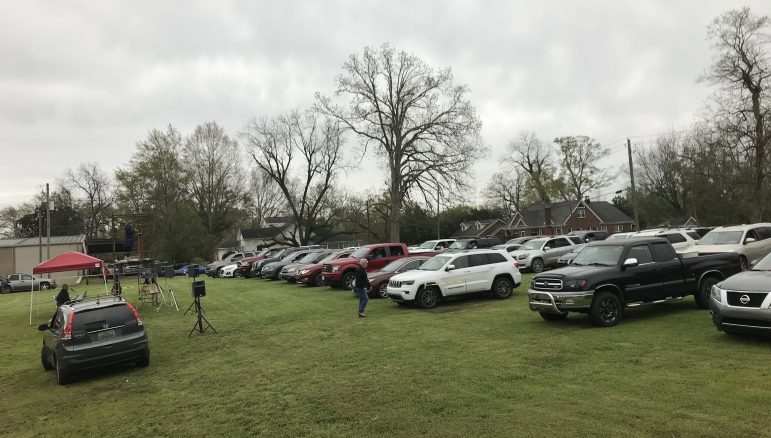Sunday Church Drive-In Style In The Coronavirus Age
Like so many others, churches have had to adapt to a world with coronavirus. Social distancing and bans on large groups mean regular Sunday services are not possible. Some have moved to live streaming their gatherings. Others have posted videos church members can watch later. But one Alabama church found another option: a drive-in service.
At Clanton First United Methodist Church, ushers would normally be guiding people to their seats. But on this Sunday, they were directing traffic onto a grassy lot across from the church building.
Pat Baker is in one of those cars with her husband, daughter and toddler granddaughter, Henley. Baker says they’ve been cooped up, and what better place to go than church. Henley can hardly contain herself.
“She don’t know what’s going on but she’s excited,” Baker says. “One good thing about it, we can roll up the window if she gets too loud.”
Pastors Wes and Meghan Kelley co-lead the church. Wes Kelley says internet can be slow in a rural area, and live streaming takes a lot of work for church volunteers. But the bigger issue to them is that watching a service is passive. So they looked to another church tradition. Meghan Kelley says for decades their church has offered services during the summer on Lake Mitchell.
“People drive up in their boats,” Kelley says. “We basically do this, but out at the river.”
Kelley says that served as a model for this drive-in service. There are more restrictions given the coronavirus. No one is allowed out of their cars, so no bathrooms. Church member Angela Bachelor is a nurse with training in disaster response. She’s wearing rubber gloves for her task at this service.
“My job is to, if we see them getting out of their cars, I’m supposed to be the nice but yet hammer and go and just say, “No, no, no. You’ve got to get back in the car,’” Bachelor says.
A keyboardist sits under a tent. In front of that is scaffolding holding a pulpit. Pastor Meghan Kelley scales the tower and looks out at the dozens of cars lined up in the grass.

“Good morning, friends,” Kelley calls out. “It is so good to see everybody. I did not realize how much I missed seeing your faces. You guys are so great to come out today.”
In many respects, it’s like any other church service. They sing and pray. Pastor Wes Kelley delivers a sermon.
There’s no handshaking of course. Church-goers are encouraged to wave at one another or text. But there is one thing that would not happen in a regular service. As the last prayer is spoken, the kids move to the drivers seats and lay on the horns. It’s a joyous sound.
The cars stream out as volunteers break down the equipment trying to beat the approaching rain. Wes Kelley is pleased. He expects to do it again.
“We’re going to try and make it better and better each week,” Kelley says. “It looks like we may be dealing with this for quite a while.”
It’s not the regular service at Clanton First United Methodist Church. But it is a sense of normalcy at a time in which that can be hard to find.
Birmingham is 3rd worst in the Southeast for ozone pollution, new report says
The American Lung Association's "State of the Air" report shows some metro areas in the Gulf States continue to have poor air quality.
Why haven’t Kansas and Alabama — among other holdouts — expanded access to Medicaid?
Only 10 states have not joined the federal program that expands Medicaid to people who are still in the "coverage gap" for health care
Once praised, settlement to help sickened BP oil spill workers leaves most with nearly nothing
Thousands of ordinary people who helped clean up after the 2010 BP oil spill in the Gulf of Mexico say they got sick. A court settlement was supposed to help compensate them, but it hasn’t turned out as expected.
Q&A: How harm reduction can help mitigate the opioid crisis
Maia Szalavitz discusses harm reduction's effectiveness against drug addiction, how punitive policies can hurt people who need pain medication and more.
The Gulf States Newsroom is hiring a Community Engagement Producer
The Gulf States Newsroom is seeking a curious, creative and collaborative professional to work with our regional team to build up engaged journalism efforts.
Gambling bills face uncertain future in the Alabama legislature
This year looked to be different for lottery and gambling legislation, which has fallen short for years in the Alabama legislature. But this week, with only a handful of meeting days left, competing House and Senate proposals were sent to a conference committee to work out differences.







